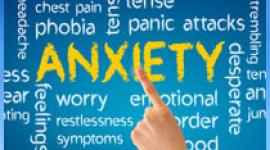Nutrition Therapy for Anxiety Disorders
It is well-known that certain foods and substances tend to create additional stress and anxiety, while others promote a calmer and steadier mood. Certain natural substances have a direct calming effect and others are known to have an antidepressant effect.
Stimulants
 Caffeine - coffee, tea, alcohol, coke stimulate an adrenal response in your body, which can provoke anxiety, nervousness and insomnia to name a few side effects. They also deplete the body of necessary vitamins and minerals that help balance our mood and nervous system. Recommended dosage - less than 100mg per day (one cup of percolated coffee or two diet cola beverages per day. Less than 50mg per day is preferable.
Caffeine - coffee, tea, alcohol, coke stimulate an adrenal response in your body, which can provoke anxiety, nervousness and insomnia to name a few side effects. They also deplete the body of necessary vitamins and minerals that help balance our mood and nervous system. Recommended dosage - less than 100mg per day (one cup of percolated coffee or two diet cola beverages per day. Less than 50mg per day is preferable.
Nicotine - this is as strong as caffeine - it stimulates increased physiological arousal, vasoconstriction and makes your heart work harder. Smokers tend to be more anxious than non-smokers and tend to sleep less well than non-smokers.
Stimulant Drugs - beware of prescription drugs that contain caffeine and amphetamines, and recreational drugs such as cocaine that increase levels of anxiety and panic attacks in people using them.
Salt
Salt depletes the body of potassium, a mineral important to the proper functioning of the nervous system. Salt raises blood pressure that in turn puts a strain on the heart and arteries and hastens arteriolosclerosis. Recommended dosage - do not excess 1gm of salt per day.
Preservatives
There are over 5000 chemical additives in commercial food processing. Our bodies are not equipped to handle these, and little is known about long term biological effects. Try and eat whole unprocessed foods as much as possible. Try to purchase vegetables and fruit that haven't been treated with pesticides (organically grown).
Hormones in Meat
Most commercially forms of meat have been fed hormones to promote fast weight gain and growth. One hormone diethylstilbestrol (DES) has been implicated in the development of breast cancer and fibroid tumors. Try to replace red meat, pork and poultry with organically raised beef, poultry and fish such as cod, salmon, snapper, sole, trout.
Sweet, refined foods
Reduce intake of sweet refined foods as these affect the blood sugar that can lead to anxiety and mood swings while also affecting how the brain functions.
MSG
MSG from Chinese takeaway should be avoided as it can have a major irritating effect on the nervous system producing the following: headaches, tingling, numbness and chest pains.
Drink Soda Water
Soda water increases the levels of carbon dioxide that helps the body to become balanced when someone is hyperventilating. Soda water also decreases smooth muscle contractions and dilates blood vessels, which allows blood to flow easily around the body.
Food Allergies
Be aware to check for food allergies as they can be one of the main causes of many emotional problems.
Food to eat to reduce anxiety and maintain calm state
- Wholegrain cereals
- Asparagus
- Garlic
- Eggs
- Fish
- Molasses
- Wheat germ
- Brewers yeast
- Carrots
- Onions
- Beetroot
- Spinach
- Paw paw
- Celery
- Stone fruit
- Avocado
Stressful Eating Habits
Stress and anxiety can be aggravated not only by what you eat, but the way you eat. Any of the following habits can aggravate your daily level of stress:
- Eating too fast or on the run
- Not chewing food at least 15-20 times per mouthful
- Eating too much to the point of feeling stuffed or bloated
- Drinking too much fluid with a meal which can dilute stomach acid and digestive enzymes (one cup with a meal is sufficient)
These behaviours put strain on your stomach and intestines in their attempt to properly digest and assimilate food. This increases stress in two ways:
- Directly through indigestion, bloating, and cramping
- Indirectly through malabsorption of essential nutrients
Nutrients
There are specific nutrients which can decrease anxiety. These include:
Magnesium aids with muscle relaxation, maintenance of the heart muscle, neuromuscular transmission and widening of the blood vessels. A deficiency of magnesium can cause
- Agitation
- Anxiety
- Behavioral disturbances
- Confusion
- Cold hands and feet
- Depression
- Insomnia
- Restlessness
B Complex Vitamins these are the spark plugs for our body. They help provide energy by acting with enzymes to convert major nutrients such as carbohydrates to energy forms. They are important for the normal function of the nervous system and are helpful in bringing relaxation or energy to individuals who are stressed or fatigued. A deficiency of certain B vitamins will cause:
- Fatigue
- Irritability
- Nervousness
- Depression
- Insomnia
- Loss of appetite
Calcium works with maintenance of electrolyte balance, muscle contractions, nerve transmission, regulation of cell division, hormone secretion and bone and teeth formation. A deficiency can cause:
- Agitation
- Depression
- Heart palpitations
- Insomnia
- Irritability
Sources:
- Part of the information in this section on Nutrition has been provided by Janet Schloss, a qualified Naturopath and Nutritionist from Brisbane, Australia.
- Bourne, E.J. The Anxiety and Phobia Workbook, (4th Ed) 2005. New Harbinger Publications.
next: Relaxation Therapy for Anxiety Disorders
~ anxiety-panic library articles
~ all anxiety disorders articles
APA Reference
Tracy, N.
(2007, February 23). Nutrition Therapy for Anxiety Disorders, HealthyPlace. Retrieved
on 2026, February 3 from https://www.healthyplace.com/anxiety-panic/articles/nutrition-therapy-for-anxiety-disorders


